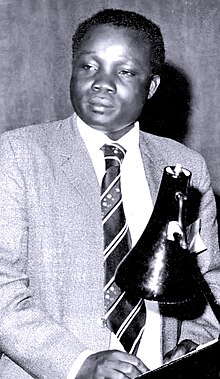Emmanuel Amey Ojara
Dr. Emmanuel Amey Ojara | |
|---|---|
 Dr. Ojara addressing a session of the Association of Surgeons of East Africa - ASEA, (now merged into the College of Surgeons of East, Central and Southern Africas - COSECSA). | |
| Born | 10 February 1944 Layibi, Gulu District, Uganda |
| Died | 26 July 1987 (aged 43) |
| Nationality | Ugandan |
| Citizenship | Uganda |
| Alma mater | Makerere University (Bachelor of Medicine and Bachelor of Surgery) (Master of Medicine in surgery) |
| Occupation(s) | Medical doctor, surgeon & university lecturer |
| Years active | 1972 - 1987 |
| Known for | Surgical skills |
| Title | Senior Lecturer University of Nairobi |
| Spouse | Agnes Mary Waithira Ojara |
Emmanuel Amey Ojara, MBChB, MMed Surgery, (10 February 1944 – 26 July 1987) was a medical doctor, surgeon, and oncologist in East Africa. At the time of his death, he was a senior lecturer at the University of Nairobi, School of Medicine.
Background
Ojara was born to Simeon Oyoo and Yudia Akidi Oyoo at Layibi Village, Gulu District, approximately 6 kilometres (3.7 mi), by road, southwest of the central business district of Gulu,[1] the largest city in the Northern Region of Uganda.[2]
Education
After attending primary school locally, he entered Gulu Junior School and in 1960, transferred to Samuel Baker Secondary School.[3] He completed both his O-Level and A-Level studies at this school, graduating in 1965. In 1966, he was admitted to the Makerere University School of Medicine, the oldest medical school in Uganda.[4] In 1971, he graduated with a Bachelor of Medicine and Bachelor of Surgery degree. Following one year of internship and another year of practice as a medical officer, he was accepted into the postgraduate Master of Medicine program, a collaborative undertaking between Makerere University and the Mulago National Referral Hospital.[5] In 1976, he was awarded a Master of Medicine in Surgery degree.[citation needed]
Career

Following his first degree, he worked as an intern at Mulago Hospital from 1971 until 1972. He then worked as a medical officer for the Uganda Ministry of Health, stationed at Butabika Hospital[6] in Kampala, from 1972 until 1973. In 1973, when he entered the Master of Medicine in Surgery program, Makerere University appointed him an assistant lecturer, a title he carried until his graduation in 1976, when he was promoted to lecturer.
In 1977, at the height of Idi Amin's brutality,[7] Ojara and his family fled to neighbouring Kenya. He was appointed lecturer at the University of Nairobi School of Medicine and registrar at Kenyatta National Hospital, the teaching hospital of the medical school. At the time of his death, he had been promoted to senior lecturer at the medical school and had begun a research towards a cure for cancer. His research interests centred around intestinal cancer.
Other considerations
In 1968, while in his third year of medical school, he married Agnes Waithera who was a Bachelor of Education student at Makerere. Together, they were the parents of three sons and one daughter (Patrick Otim, John Ojara, Michael Oyoo and Stellah Adoch). He was a member of Uganda People's Congress[8] political party and chairman of the UPC Kenya Chapter. Ojara died at Nairobi Hospital,[9] a private medical facility in Nairobi, after a series of organ failures ending in cardiac arrest. He was 43 years old.
See also
- Makerere University College of Health Sciences
- List of medical schools in Uganda
- List of hospitals in Uganda
References
- ^ "Travel Distance Between Gulu And Layibi With Ma". Globefeed.com. Retrieved 18 March 2015.
- ^ UBOS (27 August 2014). "The Population of The Regions of the Republic of Uganda And All Cities And Towns of More Than 15,000 Inhabitants". Citypopulation.de Quoting Uganda Bureau of Statistics (UBOS). Retrieved 18 March 2015.
- ^ Lucima, Otim (25 June 2012). ""By The Stream Stands A School," Sir Sam Baker". Daily Monitor (Kampala). Retrieved 18 March 2015.
- ^ Senkaaba, Stephen (25 August 2009). "Makerere University Medical School Becomes A College". New Vision (Kampala). Archived from the original on 26 December 2014. Retrieved 18 March 2015.
- ^ Masikye Namoah, Alfred. "The Academic Registrar of Makerere University Invites Applications for Admission to Graduate Programmes for the 2013/2014 Academic Year" (PDF). Daily Monitor (Kampala). Archived from the original (PDF) on 2 April 2015. Retrieved 18 March 2015.
- ^ "About Us".
- ^ Kaufman, Michael T. (17 August 2003). "Idi Amin, Murderous and Erratic Ruler of Uganda in the 70's, Dies in Exile". The New York Times.
- ^ "UPC ..::|::.. Uganda Peoples Congress". www.upcparty.net. Retrieved 22 February 2024.
- ^ "The Nairobi Hospital". thenairobihosp.org. Retrieved 22 February 2024.
- Use dmy dates from March 2015
- Articles with hCards
- All articles with unsourced statements
- Articles with unsourced statements from February 2016
- Ugandan surgeons
- Makerere University alumni
- 1944 births
- 1987 deaths
- People from Gulu District
- Academic staff of Makerere University
- Academic staff of the University of Nairobi
- People from Northern Region, Uganda
- Ugandan expatriates in Kenya
- Acholi people
- 20th-century surgeons